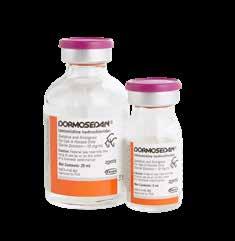
3 minute read
Sponsored Editorial
Dental Exams: Help Your Clients Realize Their Importance to Horse Health
As a veterinarian you can tell a lot from these regular checks
By Jeff A. Hall, DVM, Senior Veterinarian, Equine Technical Services, Zoetis
A 2019 equine dental study, published in the Journal of Equine Veterinary Science, revealed there is an established link between common horse behavior problems and abscessed cheek teeth. Periapical infections in cheek teeth are common in horses1 and will usually induce pain that horses then exhibit in their behavior.
Despite this established connection between dental pain and behavior problems, many horse owners are unaware of the impact dental challenges can have on their horse’s health and performance. A 2020 equine dental wellness survey conducted by Zoetis revealed that out of nearly 4,000 horse owners from across the U.S., 73% indicated their horse was showing at least 1 behavior associated with dental pain.2 Yet 22% of respondents indicated their horse hasn’t had a dental exam in at least 12 months.2
I find that horse owners sometimes hesitate to schedule annual dental exams because they are unsure about what goes into an exam and what their horse will experience. Veterinarians have an opportunity to educate horse owners about the importance of dental exams, and the impact dental challenges can have on their horse’s well-being and behavior.
HELP CLIENTS KNOW WHAT TO EXPECT DURING DENTAL EXAMS
Take the time to follow up with clients who haven’t brought their horse in for a dental exam. Reassure clients that dental exams are safe, routine procedures for their horse by helping them know what to expect. This includes how long the exam will last and what you’re looking for as you examine their horse. As part of this conversation, explain that in order to complete a thorough visualization and palpation of the mouth and teeth, the horse must be sedated. Sedation helps ensure compassionate care for the horse and precise control for the veterinarian performing the procedure.
SEDATION FOR A SAFE DENTAL EXAM
Sedation isn’t only for the horse’s safety. It’s also for the safety of you, your technician, or anyone handling the horse. A consistent, reliable sedative is preferred — one that provides pain control to help ensure the horse’s comfort throughout the exam is also advantageous. in just 1 dose. It’s supported with 30 years of safety data and provides the veterinarian with predictable sedation.3 And veterinarians continue to rate DORMOSEDAN highest of all equine sedation products for reliability.3 Learn more about it by visiting Dormosedan.com.
DORMOSEDAN® Sterile Solution (detomidine hydrochloride) meets equine sedation and analgesic needs SCHEDULING DENTAL EXAMS IN SPRING WELLNESS EXAMS Remind your clients that spring physical exams are the perfect time to complete a full wellness check that includes a dental exam, vaccination against the five core (potentially fatal) diseases and risk-based diseases as needed, as well as a fecal exam followed by the appropriate deworming administration. Just like vaccinations and parasite control, a thorough dental exam helps set horses up for a successful and healthy year.
SCHEDULING DENTAL EXAMS IN SPRING WELLNESS EXAMS Remind your clients that spring physical exams are the perfect time to complete a full wellness check that includes a dental exam, vaccination against the five core (potentially fatal) diseases and risk-based diseases as needed, as well as a fecal exam followed by the appropriate deworming administration. Just like vaccinations and parasite control, a thorough dental exam helps set horses up for a successful and healthy year.
IMPORTANT SAFETY INFORMATION: Do not use DORMOSEDAN STERILE SOLUTION in horses with pre-existing atrioventricular (AV) or sinoatrial (SA) block, with severe coronary insufficiency, cerebrovascular disease, respiratory disease, or chronic renal failure. Intravenous potentiated sulfonamides should not be used in anesthetized or sedated horses. Careful consideration should be given to horses approaching or in endotoxic or traumatic shock, to horses with advanced liver or kidney disease, or to horses under stress from extreme heat, cold, fatigue, or high altitude. Do not use in horses intended for human consumption. Handle dosing syringes with caution to avoid direct exposure to skin, eyes or mouth. See full Prescribing Information.
REFERENCES 1 Pehkonen J, Karma L, Raekallio M. Behavioral Signs Associated With Equine Periapical Infection in Cheek Teeth. Journal of Equine Veterinary Science. 2019;77:144-150. 2 Zoetis Equine Dental Risk-Assessment Survey Results. Zoetis U.S. Market Research. May 30, 2020 3 Data on file, 2020 Equine Pain & Sedation Market Research Study. Aug. 10, 2020
All trademarks are the property of Zoetis Services LLC or a related company or a licensor unless otherwise noted. DORMOSEDAN is trademark owned by Orion Corporation Orion Pharma Animal Health. It is manufactured by Orion Corporation and distributed by Zoetis under license from Orion Corporation Orion Pharma Animal Health. © 2021 Zoetis Services LLC. All rights reserved. GEQ-00676






